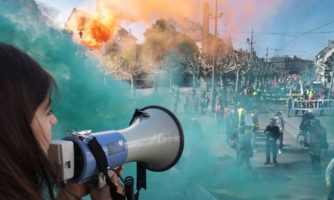
Three years after the emergence of Covid-19, the Americas continued to experience the devastating effects of the pandemic. Authorities failed to guarantee millions of people’s access to basic rights to food, water and health and healthcare systems remained critically underfunded. Against the backdrop of an economic downturn, authorities in many countries intensified their use of repressive tactics to silence dissent and many forms of protest. Several governments declared states of emergency that led to a series of grave human rights violations, including arbitrary arrests, unfair trials and unlawful killings. In other cases, repressive crackdowns included excessive use of force against people exercising their right to protest, unlawful surveillance and monitoring of activists and attacks against journalists. Indigenous peoples, Black people and other people facing racial discrimination continued to be disproportionately affected by human rights violations, including abuses by the police and torture and other ill-treatment in migrant detention centres. There were major setbacks regarding sexual and reproductive rights and authorities in various countries approved measures that undermined access to abortion and banned comprehensive sexuality education. Violence against women and girls remained widespread and LGBTI people continued to be at risk, with killings of transgender people reaching record levels in some countries. In several countries authorities took action to bring to justice some of those responsible for past crimes, but impunity for grave human rights violations generally remained entrenched. Governments failed to fulfil their commitments on climate change. Faced with historic levels of people seeking refuge or a better life abroad, authorities implemented retrogressive policies that undermined the rights of refugees and migrants and contravened international law.
Read MoreLuz Saviñón 519, Col. del Valle Norte, Del. Benito Juárez, CP 03103, México DF